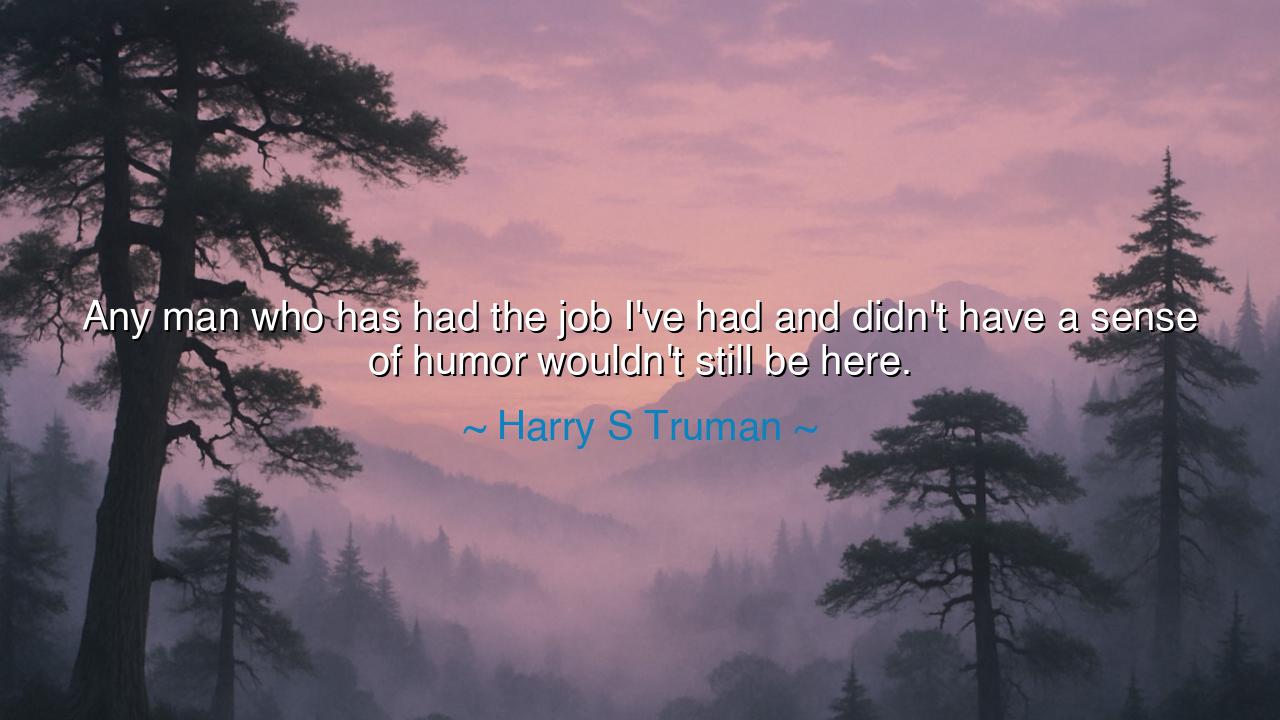
Any man who has had the job I've had and didn't have a sense of
Any man who has had the job I've had and didn't have a sense of humor wouldn't still be here.






In the great theater of life, where the weight of leadership often presses heavily upon the shoulders of those who bear it, there is a timeless truth: humor is not a mere luxury but a lifeline, a source of strength and resilience that enables us to endure the greatest trials. Harry S. Truman, the 33rd President of the United States, in his words, "Any man who has had the job I've had and didn't have a sense of humor wouldn't still be here," speaks to this ancient wisdom. His reflection is not just about personal survival but about the profound ability of humor to serve as a shield, a way to navigate the stormy seas of power, responsibility, and human suffering.
The weight of leadership is a burden known well throughout history. Consider, if you will, the great Alexander the Great, who, in his campaigns across the world, was faced with insurmountable challenges and immense pressure. Despite the great weight of his military conquests, Alexander was known to have a quick wit and a lightness of spirit, which he often used to ease the tension of his troops and bring them together. Humor, even in the harshest of circumstances, served as a balm for the soul and a means to lift the spirits of those around him. The same was true for Truman, who found himself thrust into the most difficult of circumstances—the end of World War II, the advent of the nuclear age, and the onset of the Cold War. In such moments, a leader could easily be crushed by the weight of their decisions, but with humor, Truman learned to carry the burden with a lightness that became his trademark.
In the world of the Romans, the leaders of ancient times understood well the role of humor in leadership. Julius Caesar, whose reign was marked by both great victories and immense personal trials, was a man known for his wit as much as for his military genius. It is said that even in the midst of battle, Caesar would use humor to inspire his men, to cut through the tension and remind them that even in the face of death, the human spirit must endure with grace and laughter. This ability to laugh in the face of adversity, to see the absurdity of the world even as it threatens to overwhelm us, is a trait that all great leaders possess. Humor becomes the weapon that allows them to withstand the storms of life and leadership, to endure the impossible, and to guide their people through hardship.
But Truman’s words also speak to something deeper: the need for resilience in leadership. When one carries such heavy responsibilities, the mind can easily become clouded by stress, fear, and burden. To confront such challenges without a sense of humor is to risk being consumed by them. The ancient philosophers, such as Seneca, understood the importance of mental fortitude. In his writings, Seneca often spoke of the need for leaders to cultivate inner strength, not just through reason and virtue, but through the ability to maintain perspective, to find light even in dark times. Humor is the tool that helps a leader see beyond the immediate chaos, to maintain clarity, and to rise above the circumstances that would otherwise crush them.
It is no coincidence, then, that Truman, whose presidency was marked by some of the most difficult decisions in modern history, understood that a sense of humor was essential for his survival—not just physical, but psychological. He faced the drop of the atomic bomb, the shaping of a post-war world, and the pressures of international diplomacy, all while trying to maintain the trust and stability of his country. Without the ability to laugh, to see the absurdity of the world and still move forward, he would have faltered under the weight of it all. Humor, in this sense, becomes a form of self-preservation—a shield against the mental and emotional toll that leadership exacts on the human soul.
In our own lives, we too must learn the wisdom of humor. The challenges we face, whether personal or professional, often threaten to overwhelm us. We are all, in some way, leaders—leading our families, our communities, our own selves through the trials and tribulations of life. And like Truman, we must learn to embrace humor as a tool for survival, not just in times of joy, but in times of hardship. It is the laughter that helps us endure, that keeps us resilient, and that reminds us of the absurdity of life even in our darkest moments.
So, let us follow the example set by the great leaders of the past and Truman himself. When life presses down upon us, when the burdens of responsibility seem too great to bear, let us remember the power of humor. It is not a sign of weakness, but of strength. It is the shield that protects us from despair, the light that guides us through the shadows. And in this, we find the resilience to endure, to lead, and to move forward with the wisdom that the best way to navigate the world is not with fear, but with a light heart and a steady spirit.






AAdministratorAdministrator
Welcome, honored guests. Please leave a comment, we will respond soon